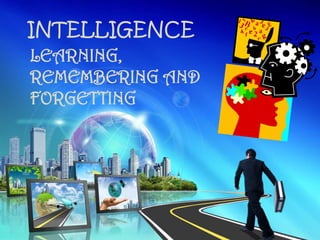
Psychology-INTELLIGENCE
- 2. What is Intelligence ? Intelligence is the ability to learn about, learn from understand, and interact with one’s environment. This general ability consist of a number of specific abilities : Adaptability to a new environment or to change in the current environment Capacity for knowledge and the ability to acquire it Capacity for reason & abstract thought Ability to comprehend relationships Ability to evaluate & judge Capacity for original and productive thought
- 3. Approaches to define Intelligence: • PSYCHOMETRIC APPROACH : gives emphasis on quantifying cognitive factors that compose intellectual performance. Lumpers ( psychologist who adherents of psychometric approach) o Lump or put the cognitive factors together. They define Intelligence as a general unified capacity for reasoning, acquiring knowledge and solving problems. Splitters ( psychologist who adherents of psychometric approach) o Define Intelligence as consisting of separate mental abilities that function more or less independently. Howard Gardner, one of the splitters was against the idea that intelligence is a single factor that can be measured by a single score, such as IQ score. Based on Gadner’s multiple- factor theory there are at least eight multiple intelligences.
- 4. Gardner’s Multiple-factor Theory LINGUISTIC INTELLIGENCE The ability to use the language proficiently MUSICAL INTELLIGENCE An linking to music; the person can compose songs, sings very well LOGICAL- MATHEMATICAL INTELLIGENCE Involves numeric ability, good in abstract making SPATIAL INTELLIGENCE The ability to correlate lines rhythm, colors, spaces, these people tend to become successful engineers, architects & interior designers. BODILY-KINESTHETIC INTELLIGENCE Good coordination to movements; ability in athletics INTRAPERSONAL INTELLIGENCE Ability to understand oneself, own thoughts and feelings
- 5. Approaches.. • INFORMATION-PROCESSING APPROACH : defines intelligence by analyzing contents of the cognitive processes which people employ to solve problems. Robert Strenberg’s (1985) Triarchic Theory – states that intelligence can be divided into three ways of gathering and processing information. These are : 1) Analytical or logical thinking skills which are measured by traditional intelligence tests 2) Problem-solving skills which need creative thinking 3) Practical thinking skills which help in the adjustment process of the individual.
- 6. Assessment of Intelligence Alfred Binet (french psychologist) • Intelligences is a collection of mental abilities and the means to measure one’s intelligence is through his ability to do cognitive tasks such as understanding the meaning of terminologies or being able to follow instruction. • In 1905, Binet and psychiatrist Theodore Simon succeeded in developing the first standardized intelligence test known as Binet- Simon Intelligence Scale. It contained questions that evaluate vocabulary, memory, common knowledge and other cognitive abilities. • Mental Age – method of estimating child’s intelligence through comparing child’s intelligence through comparing child’s score on an intelligence test with the scores of average children of the same age.
- 7. • Psychological Test - written, visual, or verbal evaluations administered to assess the cognitive and emotional functioning of children and adults. • Two Characteristics of Good Psychological Test : Reliability : refers to consistency. It means that a person’s scores on a test or on similar tests given at different periods of time are close or almost the same. Validity : means that the test measures what it is supposed to measure. Characteristics of a Good Test
- 8. Examples of Intelligence Test • Raven Progressive Matrices – a widely use intelligence test in many research and applied settings. In each item, one is asked to find missing pattern in a series. RPM was designed primarily as a measure of Spearman’s g. There are 3 different tests for different abilities: Colored Progressive Matrices (younger children & special groups)
- 9. Standford Progressive Matrices ( average 6-80 years old) Advance Progressive Matrices ( above average adolescents & adults) Examples…
- 10. • The Stanford-Binet Intelligence Scale: Fourth Edition (SB: FE) is a standardized test that measures intelligence and cognitive abilities in children and adults, from age two through mature adulthood. • The Stanford-Binet Intelligence Scale is considered to be one of the best and most widely used intelligence tests available. It is especially useful in providing intellectual assessment in young children, adolescents, and young adults. • Purpose : The Stanford-Binet Intelligence Scale was originally developed to help place children in appropriate educational settings. • The Stanford-Binet Intelligence Scale is comprised of four cognitive area scores which together determine the composite score and factor scores. These area scores include: Verbal Reasoning, Abstract/Visual Reasoning, Quantitative Reasoning, and Short-Term Memory. Examples…
- 11. • Verbal reasoning is understanding and reasoning using concepts framed in words. It aims at evaluating ability to think constructively, rather than at simple fluency or vocabulary recognition. Examples…
- 12. • Abstract Reasoning : the ability to analyze information and solve problems on a complex, thought-based level. Abstract reasoning tasks involve skills such as : Forming theories about the nature of objects, ideas, processes, and problem solving; – Understanding subjects on a complex level through analysis and evaluation; – Ability to apply knowledge in problem-solving using theory, metaphor, or complex analogy; and – Understanding relationships between verbal and non- verbal ideas Examples…
- 13. • Fluid intelligence refers to the degree of flexibility in thinking and the ability to reason abstractly. • Crystallized intelligence refers to the degree in which an accumulation of knowledge and skills has taken place in the course of life. Fluid intelligence and crystallized intelligence
- 16. What is Learning? • Learning refers to relatively permanent change in behavior that occurs as a result of practice, experience or training. Learning is a change in Behavior, for better or worst. It is change that occurs through practices or experience; changes in behavior due to maturation, sickness, accidents, fatigue, drug- intake are not learning. The changes in behavior must be relatively permanent, that is, it must last for a
- 17. Thank you!
